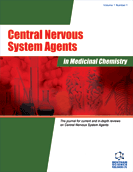-
s Berberine: A Plant-derived Alkaloid with Therapeutic Potential to Combat Alzheimer’s disease
- Source: Central Nervous System Agents in Medicinal Chemistry, Volume 19, Issue 3, Dec 2019, p. 154 - 170
-
- 01 Dec 2019
Abstract
Berberine (a protoberberine isoquinoline alkaloid) has shown promising pharmacological activities, including analgesic, anti-inflammatory, anticancer, antidiabetic, anti-hyperlipidemic, cardioprotective, memory enhancement, antidepressant, antioxidant, anti-nociceptive, antimicrobial, anti- HIV and cholesterol-lowering effects. It is used in the treatment of the neurodegenerative disorder. It has strong evidence to serve as a potent phytoconstituent in the treatment of various neurodegenerative disorders such as AD. It limits the extracellular amyloid plaques and intracellular neurofibrillary tangles. It has also lipid-glucose lowering ability, hence can be used as a protective agent in atherosclerosis and AD. However, more detailed investigations along with safety assessment of berberine are warranted to clarify its role in limiting various risk factors and AD-related pathologies. This review highlights the pharmacological basis to control oxidative stress, neuroinflammation and protective effect of berberine in AD, which will benefit to the biological scientists in understanding and exploring the new vistas of berberine in combating Alzheimer’s disease.


